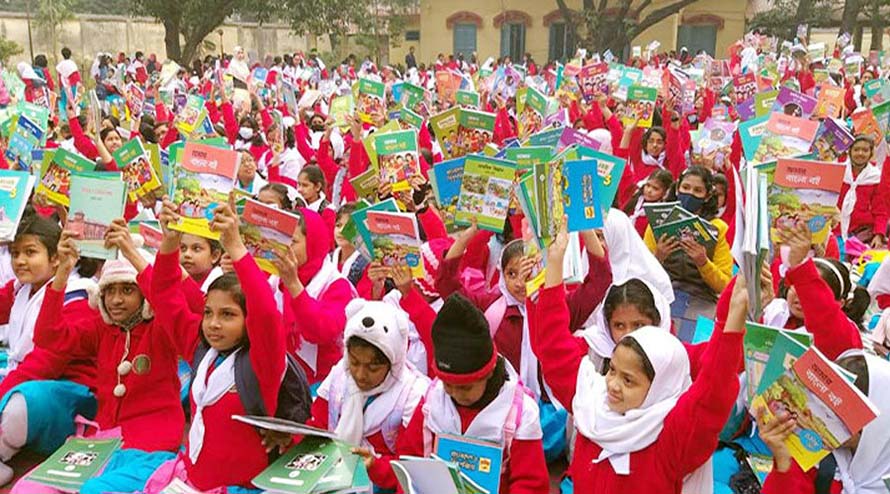The interim government has completely failed to provide books to students on time and has instead advised them to download and read the books. The National Curriculum and Textbook Board (NCTB)’s plan to give all books to pupils on the first day of the school year failed. However, the NCTB had varied plans to distribute two to three books to children on the first day of the school year. However, those plans were likewise not successful. Schools are unable to provide information on when students of each grade level will get their books.
The interim government has completely: Until until, the book festival on the first day of the year felt like a universal celebration. However, due to delays in producing the books this year, the festival will not be held.
Although the NCTB has set a goal of completing all books by January 20, others participating anticipate it will take the entire month of February to accomplish. In this regard, on Wednesday, Education Adviser Dr. Wahiduddin Mahmud will launch the textbooks’ online version at the capital’s International Mother Language Institute.
However, relevant individuals have claimed that pupils will not be able to continue their studies after downloading these online books. According to NCTB sources, the majority of the books for grades 1–3 have already been printed and distributed at the upazila level. As a result, the majority of students in these three grade levels will receive their books on the first day of school. However, the exact percentage of volumes printed for other grades has not been determined.
Inquiries at numerous schools revealed that most schools had not received the books for grades 4 through 10. However, some schools in the capital, divisional, and district cities have gotten a limited number of books for specific topics and grades. However, the schools are unsure how to distribute the scattered volumes to the children. They are waiting for more books.
Schools in rural and distant locations have not received books for grades 4–10.
As a result, schools are unable to communicate with pupils about when the books will be distributed.
When asked, Professor Dr. A.K.M. Riajul Hassan, Chairman of the National Curriculum and Textbook Board (NCTB), stated, “The printing of books for grades 1 to 3 is almost complete, and they have already reached the upazila level.” For other classes, we attempted to send some books to each upazila. On January 1, we will debut the online edition of 455 books. Our goal is to deliver all of the books to the upazila level by January 20.”
According to sources, there was a valid cause for the delay in preparing the material for this year’s textbooks. Furthermore, there was a delay in completing many processes, including the tendering procedure. As a result, those involved anticipated that it would not be able to distribute all of the books to students at the start of the year. As a result, it was recommended that efforts be made to ensure that pupils receive at least three books apiece. However, NCTB persisted with its own strategy, dismissing these suggestions. Eventually, near the conclusion, they planned to distribute three volumes each student and began pressing the printing press owners. However, by the end of the year, all of NCTB’s plans had failed.
Teachers report that for the previous two years, kids have been following a new curriculum that has been less stressful for them. However, they were suddenly forced to revert to the former curriculum. This has already caused substantial setbacks for the kids, with many trying to catch up. They did poorly on this year’s yearly tests. If it takes another two months to obtain the textbooks, kids will suffer a significant learning loss.
According to the National Curriculum and Textbook Board (NCTB), there will be 43,403,283 pupils in grades pre-primary through tenth this year. A total of 400,156,720 copies of books are being produced for them. 91,954,355 books will be printed for the 20,094,479 primary level students. 309,612,847 copies of books will be printed for the 22,458,804 secondary school students. Additionally, over 8,000 Braille books are being printed for visually impaired students. Approximately 4.1 million instructional aids are also being printed for teachers.
According to sources, the printing of books for grades one through three began well in advance, with around five million copies printed. After finishing the work orders and contracts for the sixth and seventh grades, printing began two weeks ago, with an estimated twelve million books to be printed. The printing of books for grades four, five, and eight began last week, and printing for classes nine and ten began this week. However, because tenth-grade pupils will be taking the SSC examinations after a year of study, it was decided to prioritize book completion.
Press owners claim that their presses have the potential to manufacture two hundred thousand volumes per day. Despite their best efforts, they are unable to print more than that. However, the NCETB has issued work orders for all of the books at once, asking them to complete the printing process all at once. They are pretending not to understand the situation. Previously, work orders for each grade’s books were assigned consecutively, allowing them to finish printing one grade’s volumes before proceeding to the next. However, it has not occurred this time, resulting in delays in book delivery.
According to officials, the process of publishing textbooks begins each year in July-August. Even yet, it is frequently impossible to provide all of the volumes before December. However, following the fall of the Awami League government as a result of the student movement last year, the NCETB underwent significant revisions. The chairman, members, and other administrators of the institution were replaced. The education system thereafter returned to its prior curriculum. Several changes were made to the curriculum, causing considerable delays in manuscript revision. Furthermore, due to the new NCETB officials’ lack of efficiency and planning, textbook production was severely delayed.
The interim government has completely…..The interim government has completely………The interim government has completely…….The interim government has completely………..The interim government has completely….The interim government has completely…..The interim government has completely…The interim government has completely…The interim government has completely…..



